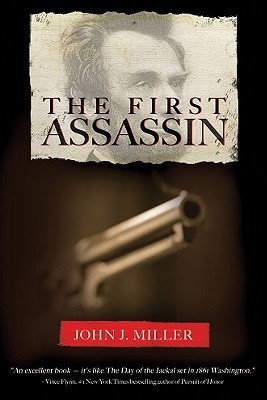What do you think?
Rate this book


John J. Miller: I’m a fan of thrillers and wanted to try to write one. The backdrop of Washington, D.C. in 1861, just as the Civil War was getting underway, seemed like an excellent setting for the right kind of plot. Once I had the idea for a story about a mysterious hitman who tries to murder Abraham Lincoln at the start of his presidency, The First Assassin became a book that I was determined to write.
Question: What other authors or books have influenced your writing?
John J. Miller: Frederick Forsyth. Among thriller writers, he’s the king. I’m also an admirer of Robert Harris, Ken Follett, Charles McCarry, Philip Kerr, Dan Simmons, Bernard Cornwell, and many others. This could be a long list.
Question: Your fellow author Robert Ferrigno has proclaimed that "there’s not a false note in the whole book." What kind of research did you do ensure historical accuracy in your historical novel?
John J. Miller: I’m a Civil War buff who grew up reading my fellow Michigan native Bruce Catton as well as many other historians. That experience provided a lot of background knowledge that’s just warehoused in my head. To write The First Assassin, however, I had to learn a lot of specifics. I made regular treks to the Library of Congress which, for many years, was right across the street from my office. What did the White House look like in 1861? Where was Washington’s seediest neighborhood? How did ordinary people respond to the fall of Fort Sumter? There are answers to all of these questions and I tracked them down in half-forgotten books and old newspapers on microfilm. My goal was to tell an exciting story that’s fictional--but one that also feels authentic, true to its time and place.
Question: Is there a character in the book you most identify with or admire? Why?
John J. Miller: I like Colonel Rook, the main protagonist. He’s charged with presidential security. He’s a Union man but not a Lincoln man--he didn’t vote for Abe and has some questions about whether this prairie lawyer is the leader America needs at its moment of crisis. He also knows his duty and he’s willing to risk insubordination to perform it.
Question: You’re also a respected nonfiction writer. What prompted your foray into fiction?
John J. Miller: I’m a fan of the form--an old English major who secretly wanted to write an entertaining thriller, even as I was trying to build a career as a journalist. When the idea of The First Assassin came to me, I couldn’t resist.
Question: How does this book compare to your previous books?
John J. Miller: The obvious difference is that it’s fiction. But there’s an important similarity as well: it dives into American history and tries to bring the past to life.
Question: In your "day job" you write for the Wall Street Journal and National Review. Have you always wanted to write? What other careers have you pursued?
John J. Miller: I think so. I certainly enjoyed it as a kid. I worked on newspapers in high school and college. Several potential career paths have presented themselves to me, but I’ve always come back to writing. A few years ago, I spoke about the writing life at a middle school career day--and then turned my remarks into a short article.
Question: What's next for you?
John J. Miller: My next book is a return to nonfiction. The Big Scrum: How Theodore Roosevelt Saved Football is scheduled for publication in 2011. Beyond that, I have an idea for a sequel to The First Assassin--a stand-alone story that will take several of the characters deeper into the Civil War.
460 pages, Paperback
First published October 29, 2009
[Imported automatically from my blog. Some formatting there may not have translated here.]
Readers of National Review will recognize the author's name: John J. Miller is one of their correspondents, and writes for other, lesser, publications too, like the Wall Street Journal. So I became aware of this book via that link, and decided to take a chance. Hey, not bad.
It's set in the dark days of 1861: Abraham Lincoln is assuming the Presidency, and the Union is being rent asunder. Anti-Union plots and conspiracies abound. But one seems more serious than others: embittered South Carolina slaveowners hire a mysterious professional killer named Mazorca to stalk and kill Lincoln only a few weeks into his first term.
The book's hero is Colonel Rook, who's part of General Winfield Scott's efforts to defend Washington D.C. Rook is a good detective, but Mazorca is ruthless and deadly. Fortunately, a few slaves become aware of the plot, and send a plucky slave girl north to inform the good guys of Mazorca's identity. But that's a perilous journey for a slave—will she make it?
Miller obviously did his historical homework, especially in describing the 1861 environs. (The US Capitol dome under construction; the Washington Monument unfinished; Mount Vernon falling into disrepair.) I thought I caught one anachronism when a character uses the word "okay" — surely that wasn't used in 1861? No, I was wrong, it was in normal use long before then.
It's a pageturner, no doubt. If I had to quibble, it's a little in-your-face about history. (Yes, someone does exclaim to Rook: "Colonel! Fort Sumter has given up!")
I read this in paperback, so that's where the Amazon link will take you, but the Kindle price of $4.99 is kind of a steal.